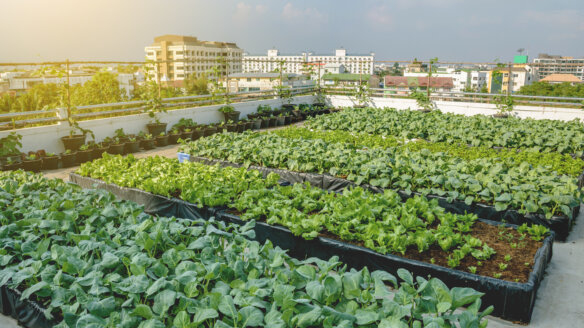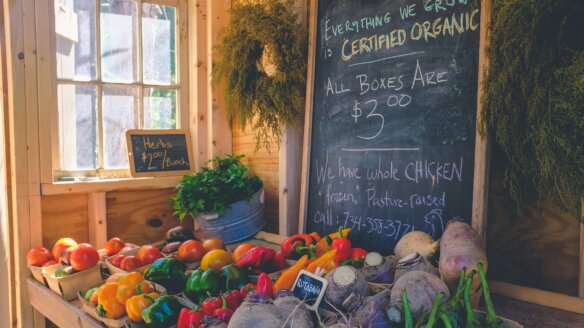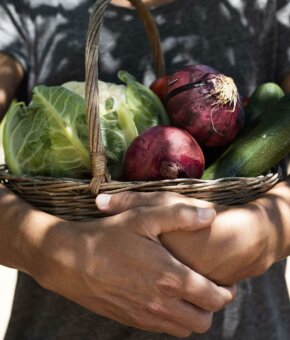
How can we solve climate change and obesity, put a stop to biodiversity loss, boost local economies and make the world more circular? According to Meiny Prins, it all starts with bringing sustainable urban food production back to the city. “All the big challenges we face today are interconnected. And they all relate to the way we produce and transport our food.”
From South America to Asia: megacities are rapidly expanding everywhere around the world. Over 400.000 people move from the countryside to the city every single day. Because of this, the green areas around cities – better known as green belts – are quickly disappearing. And with them the farmers who used to feed the urban dwellers. The result? A world in which cities heavily rely on a system in which food is produced on an increasingly industrial scale in a few centralized locations.
Transporting food from one continent to the other means a lot is lost along the way, adding to the ever growing mountain of food waste we produce worldwide.
This type of food production has many negative consequences, both socially and ecologically. Subsidies on fossil fuels have made it economically viable to ship food halfway across the world. This creates an enormous amount of CO2 that is destroying our climate. In addition, large scale monocultures that diminish biodiversity, cause deforestation and deplete soil health have become the norm.
At the same time, millions of people suffer from lifestyle diseases because they are living in food deserts; cities where it is almost impossible to find fresh produce. In the United States alone, obesity, high blood pressure and diabetes type 2 are costing over one billion dollars a day.
Time to reset
According to Meiny Prins, CEO of sustainable enterprise Priva and founder of the Sustainable Urban Delta is a foundation with a clear mission; creating a thriving world full of sustainable food producing cities. Find out more here: https://sustainableurbandelta.com/about/ it is time to stop investing in a broken system that is destroying both people and the planet. By bringing sustainable urban food production back to the cities and creating sustainable urban deltas, we can solve most of the major problems we are currently facing, according to Meiny. “If we start to produce our food locally in urban environments, we set a positive chain reaction in motion whereby things like growing healthy produce, recycling waste water to irrigate crops and combining energy flows between farms and households start reinforcing each other. The knowledge and technology to produce more food per square meter – and therefore for cities to feed their own growing population – are there. Now we just need to implement them.”
Possibilities
From building a small farm on the roof of a supermarket to growing mushrooms in old cellars: when it comes down to sustainable urban agriculture, the sky is the limit. “It all depends on what the entrepreneur wants to do”, Meiny explains. “You can collect food waste to feed livestock, start a regenerative farm or grow food in gutters. As long as it is economically feasible, it is possible.”

Economic viability
Meiny emphasizes the importance of having a viable business model to truly contribute to the required transition. “There is simply no use in building farms that aren’t sustainable on an economic level as well. But what that means, depends on the specific business case. For example, growing food in soil is less expensive than starting an indoor farm. So depending on your product and the value of that product, you choose the form and technology that befits your particular enterprise.”
Return of inspiration
Everywhere around the world, city governments and entrepreneurs are already working together to create these viable sustainable urban food ecosystems. In order to inspire others to follow in their footsteps, Meiny travelled around the globe to capture their stories in the documentary Sustainable Urban Delta: The city and the green belt is a 40-minute documentary full of inspiration. Watch it here: https://www.youtube.com/watch?v=CqTLjCZKY0M&feature=emb_title&ab_channel=SustainableUrbanDelta .
Bringing local food production back to the city has the power to transform complete neighborhoods and communities.
One thing she discovered whilst filming, is how bringing local food production back to the city has the power to transform complete neighborhoods and communities. “In Cincinnati, the second biggest city in Ohio, someone built an indoor farm in a disadvantaged neighborhood. At first, it was just a place that provided fresh food to the city. Then it grew and it became a place that provided jobs. Then it grew a little more and it started attracting other entrepreneurs who produce things the farm needs. After a few years, the whole neighborhood was transformed because of this. House prices were going back up, people decided to start a family in the area and schools were opened. But most importantly, people were proud of their community again and could see a future for themselves in it.”
Solving the water crisis
In addition to creating local economies full of hope and opportunity, sustainable urban deltas also have the potential to significantly boost the circular economy and thereby solve the water crisis. “Ten percent of all the water we use worldwide is used by consumers, fifteen percent by industry and a shocking seventy-five percent by agriculture” Meiny explains. “By reusing the city’s wastewater to irrigate crops, we can save an incredible amount of water – an essential ecosystem service that is becoming more scarce every single day.”
Tipping point
With her foundation Sustainable Urban Delta, Meiny aims to inspire and empower ten percent of the world’s cities to embrace sustainable urban food production as a catalyst for sustainable development. “If you can get ten percent of cities to provide food for themselves, we will reach a tipping point. Which means others will naturally follow.”

Support
In order to make this a reality, Meiny believes we need to simultaneously let go of the old and build the new, enabling a gradual transition. An important part of the former is that we need to stop directing subsidies to a system that is doing more damage than good. “Many large scale industrial farmers would go bankrupt if it wasn’t for the subsidies they are getting. They are farming in a way that’s not sustainable and therefore it cannot go on forever”, Meiny explains. “However, this does not mean we should just leave them to their own devices. Governments have a responsibility to provide a clear vision for their farmers and say: ‘This is where we stand now, this is where we are going, and don’t be afraid, because we will transition together.’”
True cost
In addition to putting our money where our mouth is, Meiny sees a crucial role for true cost pricing. “If the price of intensive meat production would reflect its true societal cost, there is no way you could buy a kilo of meat for a bargain price. By making sure the price of food reflects its true social and ecological cost, people are stimulated to buy healthy and local food.”
How to get started
According to Meiny, creating awareness at the municipality level is crucial if we want to successfully bring food production back to the city. “City planners need to provide both the space and infrastructure needed”, Meiny explains. “In addition, they need to make local people enthusiastic about building businesses related to food.”
For all mayors, city planners, local government officials and other urban professionals who want to help create sustainable urban deltas, Meiny has a few tips:
- Educate yourself and other local government officials on the principles of the sustainable urban delta and start spreading the vision.
- Connect with knowledge institutions, universities, property developers and entrepreneurs who will help you to make a difference.
- Invite us to scout the city and find suitable locations for local sustainable food production.
- Find inspiring entrepreneurs and people with farming skills or ambitions to re-energize food producing cities.
Faith in solutions
Despite the scope of the challenges at hand, Meiny believes we can keep the earth livable for future generations. “My generation has properly screwed things up. But it is not too late to fix it. Together we can create a climate resilient, circular and healthy world in which people are connected to their food. So let’s get going.”
Want to learn more about the potential of sustainable urban food production? Watch the free documentary ‘Sustainable Urban Delta; The city and the green belt’ here:



